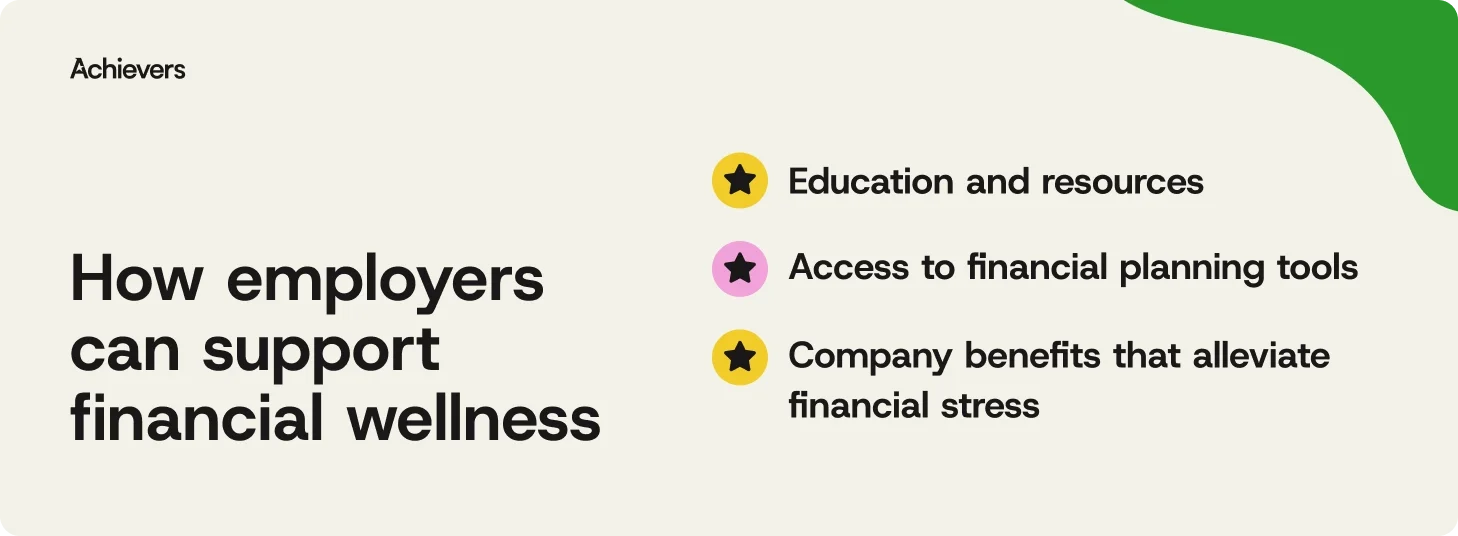Table of contents
Create a culture that means business™
Schedule a demo with an Achievers solution expert today.
Money talk at work can feel taboo — right up there with politics, religion, and who really finished the office coffee. But here’s the reality: financial stress follows employees to their desks, inboxes, and Zoom calls. And it’s costing businesses more than just awkward small talk.
According to a recent SoFi report, one in four employees say financial stress chips away at their productivity, focus, and motivation. Burnout doesn’t always come from long hours — it can also come from late fees.
The good news? When employees feel financially secure, they’re more present, driven, and engaged. And while fair pay is the foundation, companies that go further — offering financial education, advisor access, and goal-aligned benefits — can help ease stress and build loyalty.
In this blog, we’ll explore how supporting your team’s financial health pays off (yes, literally). Ready to rethink your approach to well-being? Let’s dig in.
The link between financial stress and employee wellness
Money woes don’t stay at home — they follow employees to work, zapping energy and focus. With 25% of workers saying finances hurt their performance, companies that invest in financial wellness aren’t just being nice — they’re being smart. It’s not charity, it’s strategy.
Here a just a few of the ways financial stress can negatively impact employee wellness:
Increased stress and burnout
Worried about bills? Sleep suffers, morale drops, and engagement takes a nosedive. Burnout isn’t always about workload — it’s often about money. Financial wellness programs help employees manage stress before it snowballs. Think of it as burnout prevention, not just a benefits add-on.
Lower productivity and absenteeism
Financial stress fuels absenteeism and its quieter cousin, presenteeism. The result? Lower productivity, rising workloads for teammates, and a workplace held together with caffeine and duct tape. Supporting financial health helps keep focus sharp—and people showing up as their best selves.
Mental and physical health impact
Nearly half of employees (47%) report mental health issues tied to money stress — and over a third say it hits their physical health too. From anxiety to migraines, financial stress takes a toll. A healthier relationship with money means fewer sick days — and fewer “I just can’t today” days.
How employers can support financial wellness
Money may be personal, but the workplace is a powerful place to support financial wellness. In fact, one in three employees want to boost their financial literacy — twice as many as last year. And surprisingly, many turn to their managers for advice (no pressure).
Here’s how employers can help without becoming financial gurus:

- Educate and empower: Start with the basics. Offer workshops, resources, or one-on-one coaching. Credit, taxes, debt, saving, and investing may not be thrilling topics — but understanding them can be life-changing.
- Provide tools, not just talks: Employees want to plan for the future — but many don’t know where to start. Financial planning tools and access to advisors can make a big difference. Yet while 28% of employees want an advisor, only 35% of companies offer one. There’s room to lead here
- Rethink your benefits: Want to reduce financial stress? Expand your benefits beyond the paycheck. Emergency savings programs, student loan help, and solid retirement matching all show you’re invested in their financial future — not just their 9-to-5.
Support like this doesn’t just help employees sleep better — it builds a stronger, more engaged workplace. And fewer awkward “so…how’s your 401(k)?” conversations at the coffee machine.
Using Achievers to promote financial wellness
Employers can use Achievers employee recognition program to promote financial wellness in the following ways:
- Recognition and rewards: Reward employees for leveling up their financial know-how. Use Achievers to recognize course completion, savings milestones — even peer mentoring. A little recognition can boost participation, reduce stress, and maybe even make taxes feel less terrifying (well, almost).
- Personalized rewards for financial goals: Achievers lets employees choose rewards that matter. When rewards support real-life financial goals, saving gets a little more satisfying (and a lot more likely to happen).
- Social recognition to normalize financial wellness discussions: Money talk at work? Gasp! But when peer recognition celebrates financial wins and shared wisdom, it breaks the taboo. Use Achievers to encourage conversations that actually help — like how to max out your 401(k) and still afford lunch.
- Incorporate financial wellness into engagement surveys: Not sure what financial support employees want? Ask them. Achievers’ surveys help you gather honest feedback, tailor benefits, and track progress — because guessing games belong in game night, not HR strategy.
What do companies get out of investing in financial wellness for employees?
What’s in it for employers, you ask? Supporting employee financial wellness isn’t just good for your workforce — it delivers real business benefits. From boosting engagement to building a stronger employer brand, companies that invest in financial well-being gain a competitive edge. Here’s how:
Higher engagement and retention
Want employees to stick around? Show them you’ve got their back — especially when it comes to money. Financial wellness programs signal real investment in your people, and that kind of loyalty tends to get returned. Disengagement is costly but building a culture that values employees’ well-being pays dividends — in retention, morale, and maybe fewer awkward exit interviews.
Improved productivity
When employees are busy stressing over bills, they’re not bringing their A-game. With 65% of workers feeling financial strain, productivity often takes a hit. Offering financial education and benefits helps lift that burden. It’s not magic — just practical support that helps your team focus less on money woes and more on winning at work.
Stronger employer brand
Gone are the days when “paycheck and ping pong” sealed the deal. Today’s employees want employers who support them beyond office hours. Offering financial wellness tools shows you’re serious about whole-person care — and that makes your company stand out. Good benefits talk. Great ones build a reputation worth bragging about.
Make financial wellness a workplace priority
Financial stress doesn’t clock out at 5 p.m. — so why should support for it? Leading companies know that investing in financial wellness pays off in engagement, retention, and reputation.
HR leaders can champion this by using platforms like Achievers to offer financial literacy tools, smart benefits, and recognition that helps ease money stress. Because when your people worry less about their wallets, they can focus more on their work — and maybe even enjoy it.



